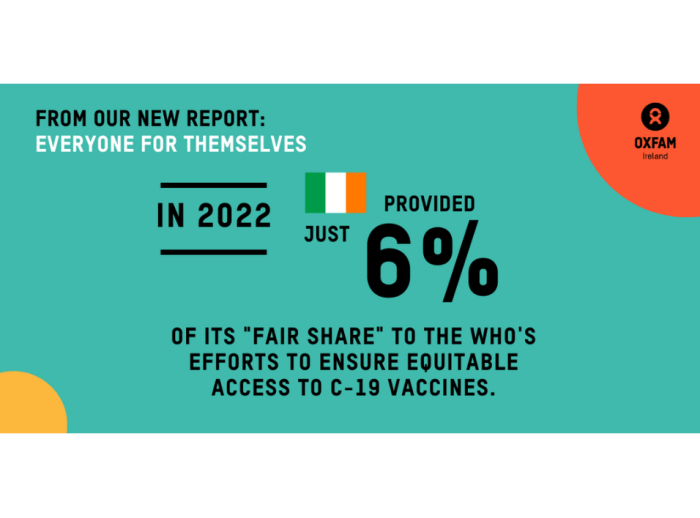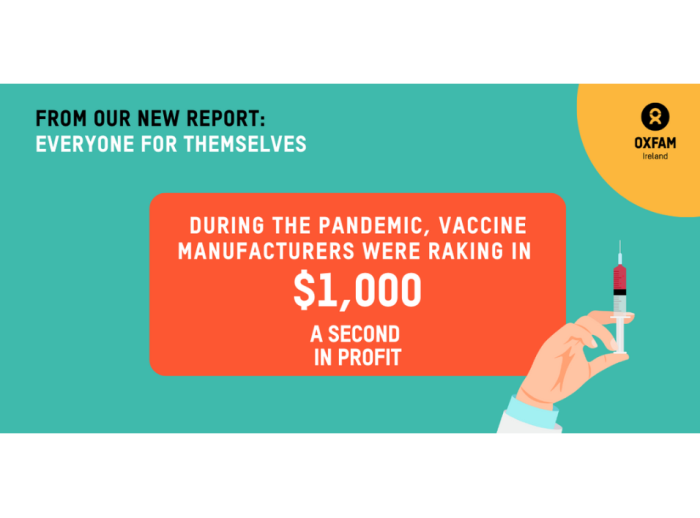- 5 min read
- Published: 8th March 2023
Learning Lessons from COVID-19 Global Vaccine Inequity

Oxfam Ireland today published a report ‘Everyone for Themselves How Ireland Undermined Efforts to Fully Vaccinate the World against COVID-19' showing how Ireland undermined international efforts to make vaccines available to low-income countries. There is an opportunity now to make sure that future pandemics don’t repeat this disastrous outcome: Countries of the World Health Organisation have begun negotiations on a Pandemic Treaty.
‘Everyone for Themselves How Ireland Undermined Efforts to Fully Vaccinate the World against COVID-19'
The report, “Everyone for Themselves - How Ireland Undermined Efforts to Fully Vaccinate the World against COVID-19” was launched in the Oireachtas today. This report details Irish government opposition to a temporary waiver of intellectual property rights for COVID-19 vaccines, therapeutics and diagnostics. This runs contrary to the government’s claims that they were a very strong supporter of global vaccine equity.
Oxfam’s detailed analysis of Irish government actions during the pandemic is under three key main headings.
- The failure to support the TRIPS[ii] waiver, against advice from the WHO, over 100 countries, two Irish parliamentary committees and the Seanad. The government’s position instead aligned with the pharmaceutical industry’s interests and stance. The report contains an analysis of the lobbying records from the pharmaceutical industry.
- Their preferred option was vaccine donations, and this was problematic. For one, the hoarding of more vaccines than was needed limiting access to low-income countries. Oxfam’s analysis also found donations were 20% short with 12% of vaccines close to expiry[iii]. In addition, we did not supply the most effective vaccines for the recipient countries[iv].
- They failed to provide adequate funding to strengthen health care systems in poorer countries to aid distribution of vaccines.
Overall, the WHO, World Health Organization, calculated that Ireland provided just 6% of our “fair share” of funding to support the response to COVID-19 globally.
“Happily, the worst effects of COVID are behind us in Ireland but we have to remember that over 6,000 people are still dying every week from COVID 19 . In low-income countries, just 23% of people are fully vaccinated. The cost of COVID continues to be enormous. It is estimated that it pushed 163 million people into poverty and set global development back by at least a decade.”— Michael McCarthy Flynn Oxfam Ireland's Head of Policy and Advocacy

“Our report shows Ireland actively contributed to a human rights violation and we’re calling today for the government to turn this appalling record around with a set of recommendations. The most immediate of which is that Ireland’s global response should be included in the upcoming State inquiry into COVID 19,” said Oxfam Ireland’s Head of Policy and Advocacy (and report co-author), Michael McCarthy Flynn.
“This is far from a matter of historical interest,” said Michael McCarthy Flynn. “Future pandemics are a certainty, and we have to learn from past mistakes and do better for all our sakes.”
Pandemic Treaty – A Chance to Avoid a Repeat of the Deadly Inequalities of COVID 19
Oxfam Ireland’s report was launched a week after the Irish negotiators returned from Geneva, where the WHO countries met for the fourth round of meetings to negotiate a pandemic treaty.
WHO Member States have been negotiating a new legal instrument (often called a ‘pandemic treaty’) since late 2021 so that countries can effectively, and equitably address future pandemics.
Negotiations on the draft will continue over the next year with the aim of adopting the instrument by 2024. Ireland is engaging in negotiations as an EU member state and through officials in the Department of Health working with Ireland's Permanent Representation to the UN in Geneva.
Oxfam, as a founding member of the People’s Vaccine Alliance has been putting forward proposals for a people-centred pandemic treaty with commitments and practical mechanisms for pandemic prevention, preparedness, response and recovery based on human rights and equity principles.
Our proposals cover key issues that must be addressed in the treaty including: innovation and equitable access to vaccines, diagnostics and treatments; sharing data and technology; building resilient health systems; transparency; and financing pandemic preparedness and response.
On 1 February, The WHO’s Intergovernmental Negotiating Body (INB) published a ‘zero-draft’ of the pandemic treaty. This formed the basis for negotiations on the final document. The zero-draft contains key principles for achieving a better and more equitable way of preventing, preparing for and responding to pandemics, addressing critical issues on access to technologies. However, the negotiations have so far failed to produce concrete commitments and enforceable measures for vaccine sharing in future pandemics. Accord language must require governments to take specific actions to ensure equity, otherwise it would be difficult to implement it in practice. It must include concrete commitments and practical mechanisms, obligations, requirements and enforceable measures, rather than being limited to promotions and encouragements.

We need more than just words. The pandemic treaty must include commitments by Governments to sharing medical technology and knowhow. The intellectual property rules that upheld the devastating vaccine inequity of COVID-19 must be waived automatically when a health emergency is declared. Governments must place conditions to ensure that publicly funded innovations are available to manufacturers in the Global South. Oxfam’s report shows that vaccine donation doesn’t work. Manufacturers in the Global South must be able to make the necessary vaccines and medical countermeasures. This is critical to controlling pandemics, which will ultimately save lives everywhere and make sure that people in lower-income countries aren’t forced to wait at the back of the line for vaccines, tests, and treatments.
NOTES
[ii] TRIPS (Trade-Related Aspects of Intellectual Property Rights) is a World Trade Organisation Agreement that protects intellectual property, including patents on medicines produced by pharmaceutical companies.
[iii] The above figures are correct as of Nov. 2022.
[iv] See footnote 13 in the Report.

